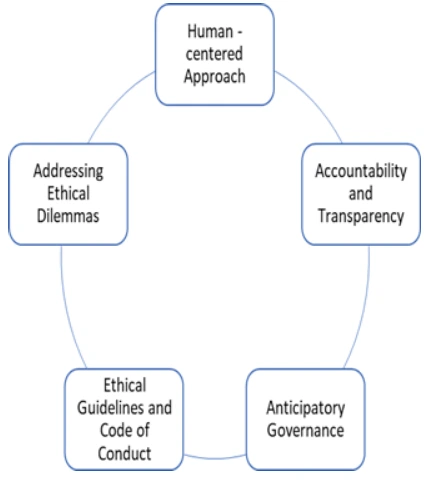Answer:
|
How to approach the question
- Introduction
- Write about the rapid evolution of technology and changing ways of living.
- Body
- Explain the role of ethics in technological governance and the responsible management of emerging technologies.
- Describe the limitations of ethics.
- Give a way forward.
- Conclusion
- Conclude on a positive note.
|
Introduction
The rapid evolution of technology, such as gene editing, artificial intelligence has propelled us into a new era, transforming industries and revolutionizing the way we live and work. As new advancements unfold, ensuring responsible and accountable use becomes imperative for shaping a sustainable and inclusive future.
Body
Role of Ethics in Technological Governance and Responsible Management of Emerging Technologies:
- Human-centred Approach: Ethics align technology with human values, e.g., in autonomous vehicles, programming prioritizes passenger safety while considering pedestrians’ well- being.
- Accountability and Transparency: Ethics demand clear guidelines and regulations. Facebook’s Cambridge Analytica scandal revealed the importance of transparency and user consent in data handling, leading to calls for stronger privacy regulations.
- Anticipatory Governance: Ethical impact assessments and gene editing technologies like CRISPR-Cas9 drive discussions on long- term consequences, urging responsible use and regulation to anticipate and mitigate potential harm.

- Ethical Guidelines and Codes of Conduct: Tech professionals follow ethical guidelines, such as IEEE’s code of ethics, ensuring consideration of social, environmental, and human impacts during technology design and implementation.
- Addressing Ethical Dilemmas: Ethical frameworks guide complex dilemmas especially in AI, addressing biases, accountability, and job displacement concerns, fostering responsible AI governance.
Limitations:
- Cultural subjectivity: Ethics can vary across cultures, making it challenging to establish universally applicable ethical frameworks.
- Pace of technological advancement: Ethical frameworks may lag behind rapidly evolving technologies, resulting in gaps and inadequate coverage of emerging ethical concerns.
- Lack of enforceability: Ethical guidelines often rely on voluntary compliance, lacking robust enforcement mechanisms, which may lead to non-compliance and ethical lapses.
- Ethical trade-offs: Complex ethical dilemmas arise where different principles conflict, making it challenging to find satisfactory resolutions that satisfy all stakeholders.
- Influence of commercial interests: Commercial motives and competition can prioritize economic benefits over long-term ethical considerations, potentially compromising responsible technology management.
Suggestion:
- Interdisciplinary collaboration: Encourage ethicists, technologists, policymakers, and stakeholders to collaborate for comprehensive ethical frameworks addressing emerging technology challenges.
- Education and awareness: Promote ethical literacy among tech professionals through workshops and training, empowering them to navigate ethical dilemmas.
- Regulatory frameworks: Enhance or establish regulations prioritizing ethics in emerging technology development, deployment, and user rights.
- Public participation: Involve the public in decision-making to ensure ethical considerations are understood and incorporated.
Conclusion:
With responsible management and a commitment to human values, we can pave the way for a sustainable and inclusive world, where emerging technologies truly enrich our lives and empower us to build a brighter future for generations to come.
To get PDF version, Please click on "Print PDF" button.


Latest Comments